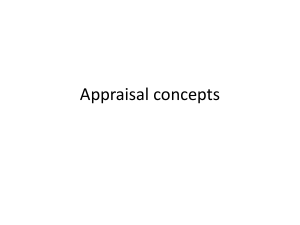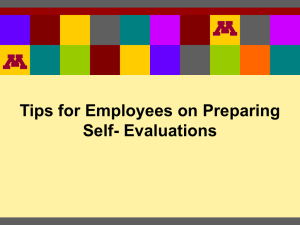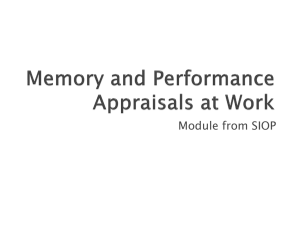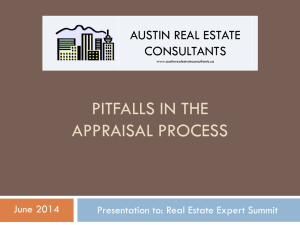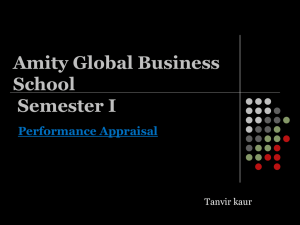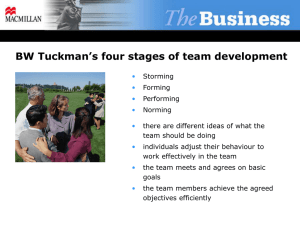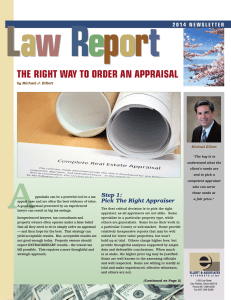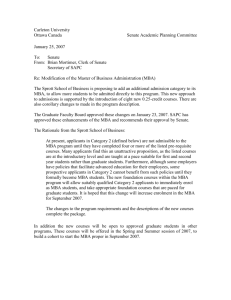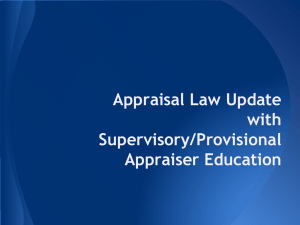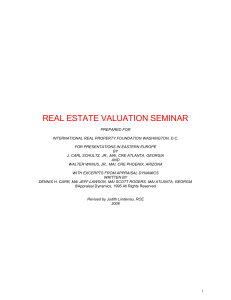Elements of an Appraisal Presentation to BDC November 18, 2014
advertisement
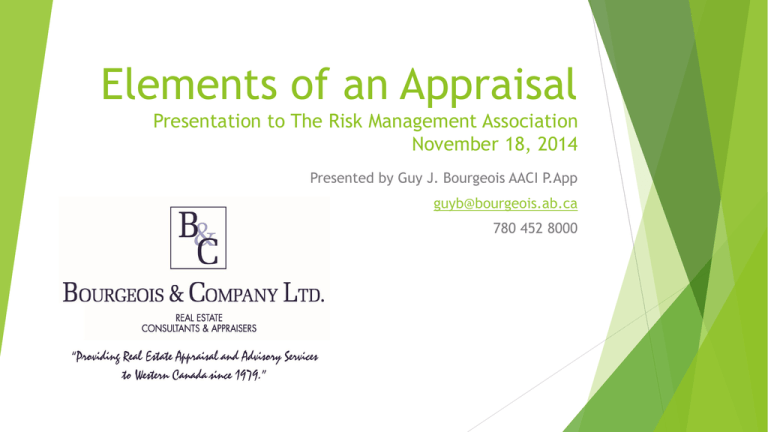
Elements of an Appraisal Presentation to The Risk Management Association November 18, 2014 Presented by Guy J. Bourgeois AACI P.App guyb@bourgeois.ab.ca 780 452 8000 What is an Appraisal anyway? It’s an opinion of value It’s not a sale! It’s not a fact! It’s not a guaranteed price! It’s not a promise! It is simply someone’s opinion !!!! So why do you trust it? Who’s opinion is it? What does he/she know? We trust- because it exists Real estate is a physical asset that we can see and feel and we know it is not going anywhere! We also know that property has utility of some sort. If it has utility it has value to someone. The level of utility is the determinant of value example farm land vs development land And combined with what we all read and hear all of us have some sense of value. So when we read an appraisal report of a qualified valuer, the information and reasoning provided should conform with what we already know, and that allows us to trust that opinion. We trust because we read positive (or negative) news about the Real Estate Market Every one reads or hears at least a little about the real estate market. And, we tend to believe whatever we read. This builds confidence in the minds of the population. Business and lay people make decisions every day based on news and information they gather. Edmonton Journal Headlines Premiers united over ‘extraordinary’ Energy East pipeline project We Trust the Valuer An Accredited Appraiser will have completed the education program offered by the association to which he/she belongs. The Appraisal Institute of Canada (AIC) requires that all candidates have a University Degree before being awarded either the CRA or AACI/P.App accreditations. CRA – Certified Residential Appraiser Residential appraisals only –SFD to triplex Be wary of co-signers that are not of the same firm. AACI/P.App – Accredited Appraiser Canadian Institute. Qualified for all property types ! But must have experience in that property type. What about the Valuer? How qualified is she/he? An appraiser with the AIC has an extensive academic requirement while working as a candidate appraiser. From start to finish it usually takes 4 to 5 years to reach the AACI P.App level. Education Requirements You are required to pass the following fifteen (15) University of British Columbia (UBC) courses, or equivalent. 1. BUSI 100 Micro Foundations of Real Estate Economics 2. BUSI 101 Capital Markets and Real Estate 3. BUSI 111 BC Real Property Law and Real Estate Ethics, OR BUSI 112 Canadian Real Property Law and Real Estate Ethics 4. BUSI 121 Foundations of Real Estate Mathematics 5. BUSI 293 Introduction to Financial Accounting 6. BUSI 300 Urban and Real Estate Economics 7. BUSI 330 Foundations of Real Estate Appraisal 8. BUSI 331 Real Estate Investment Analysis and Advanced Income Appraisal talks about leases, market rents, cap rates, yield rates, investor expectations 9. BUSI 344 Statistical and Computer Applications in Valuation Understanding data charts, computer tools to assist the appraiser 11. BUSI 401 Commercial Property Analysis The commercial property investor has different motivations than a home buyer 12. BUSI 443 Foundations of Real Property Assessment and Mass Appraisal 13. BUSI 442 Case Studies in Appraisal I 14. BUSI 452 Case Studies in Appraisal II 15. BUSI 460 Critical Analysis and Forecasting in Real Estate CUSPAP Canadian Uniform Standards of Professional Appraisal Practice All Appraisals must conform to these standards They outline the minimum requirements of all appraisals completed by licensed appraisers. The standard rules of conduct and ethics are extensive and detailed. Generally though they require that all appraisals touch on or explain specific items (27 in total). This includes proper description of the property, purpose of the appraisal, analysis of highest and best use, along with appropriate recent data and analysis among others. The appraisal must be an objective opinion and not misleading in any way. These items must always be included. Otherwise, if a complaint is ever launched referring to an appraisal that does not conform, then the Appraiser may be subject to disciplinary action and/or reeducation. Types of Appraisals Full Narrative Appraisal This is the most complete report available It should give the reader a detailed description and analysis. Summary report This is a shorter report that may have less background information However it must include the 27 essential elements Verbal Opinion. Appraisers are often asked for their opinion over the phone. These are the least reliable of all opinions. Appraisers must be careful on what we tell you. Most often we have not seen the property and the information that you provide may not be complete. So what are these 27 essential Elements? 6. APPRAISAL STANDARD RULES 6.1 Preamble 6.1.1 This Standard deals with the procedures for the development and communication of a formal opinion of value, and incorporates the minimum content necessary to produce a credible report that will not be misleading. 6.2 Rules In the report [see 7.1] the appraiser must: 6.2.1 identify the client and other intended users, by name; [see 7.2] 6.2.2 identify the intended use of the appraiser’s opinions and conclusions; [see 7.3] e.g.: a report completed for fire insurance should not be used for financing 6.2.3 identify the purpose of the assignment, including a relevant definition of value; [see 7.4] 6.2.4 identify the scope of work necessary to complete the assignment; [see 7.5] the appraiser must tell you what he/she has done to render the opinion 6.2.5 identify whether the appraisal is current, retrospective, prospective, or an update; [see 7.6] most appraisals reflect current market value but often we are required to estimate the value of a building not yet built. Be careful here. Think about when that value applies.. In an industrial building, ? An apartment? A motel? 6.2.6 provide an analysis of reasonable exposure time linked to a market value opinion; [see 7.7] This is important!!! 6.2.7 identify the effective date of the appraiser’s opinions and conclusions; [see 7.8] 6.2.8 identify the date of the report; [see 7.9] 6.2.9 identify the location and characteristics of the property and the interest appraised; [see 7.10] 6.2.10 identify all assumptions and limiting conditions; [see 7.11] 6.2.11 identify any hypothetical conditions (including proposed improvements); [see 7.12] Be very Careful Here!!! E.g. TI’s included or not!! 6.2.12 identify land use controls; [see 7.13 6.2.13 state the existing use and the use reflected in the appraisal; [see 7.14] Where existing use is not highest and best use!! 6.2.14 define and resolve the highest and best use; [see 7.15] 6.2.15 describe and analyze all data relevant to the assignment; [see 7.16] Must be current and properly analyzed!! 6.2.16 describe and apply the appraisal procedures relevant to the assignment; [see 7.17] 6.2.17 support the reason for the exclusion of any of the usual valuation procedures; [see 7.18] 6.2.18 detail the reasoning supporting the analyses, opinions and conclusions of each valuation approach; [see 7.19] This section should be logical , make sense and lead you to the same conclusion 6.2.19 analyze the effect on value, if any, of the terms and conditions of the lease(s) when developing an opinion of the value of a leased fee or a leasehold estate; [see 7.20] Be aware of the impact of low rent in a long term lease!!! 6.2.20 analyze the effect on value of an assemblage; [see 7.21] 6.2.21 analyze the effect on value of anticipated public or private improvements; [see 7.22] EG.. Edmonton LRT..some good and some bad effects 6.2.22 analyze the effect on value of any personal property; [see 7.23] E.G. FF &E in a motel…or appliances in a condo project. 6.2.23 analyze any Agreement for Sale, option, or listing of the property; [see 7.24] 6.2.24 analyze any prior sales of the property; [see 7.25] This can be very important to you!! 6.2.25 review and reconcile the data, analyses and conclusions of each valuation approach into a final value estimate; [see 7.26] 6.2.26 report the final value estimate; [see 7.27] 6.2.27 include a signed certification of value; [see 4.2] Note: An appraiser who signs a certification of value accepts responsibility for the appraisal and the contents of the appraisal report. I would be happy to answer any questions Thank you!
